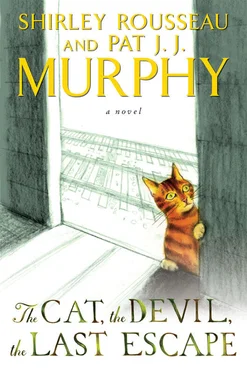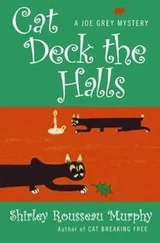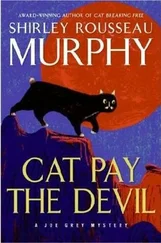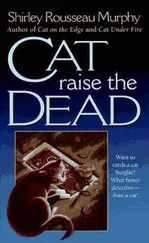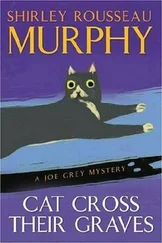Shirley Murphy - The Cat, The Devil, The Last Escape
Здесь есть возможность читать онлайн «Shirley Murphy - The Cat, The Devil, The Last Escape» весь текст электронной книги совершенно бесплатно (целиком полную версию без сокращений). В некоторых случаях можно слушать аудио, скачать через торрент в формате fb2 и присутствует краткое содержание. Издательство: HarperCollinsPublishers, Жанр: Старинная литература, на английском языке. Описание произведения, (предисловие) а так же отзывы посетителей доступны на портале библиотеки ЛибКат.
- Название:The Cat, The Devil, The Last Escape
- Автор:
- Издательство:HarperCollinsPublishers
- Жанр:
- Год:неизвестен
- ISBN:нет данных
- Рейтинг книги:3 / 5. Голосов: 1
-
Избранное:Добавить в избранное
- Отзывы:
-
Ваша оценка:
- 60
- 1
- 2
- 3
- 4
- 5
The Cat, The Devil, The Last Escape: краткое содержание, описание и аннотация
Предлагаем к чтению аннотацию, описание, краткое содержание или предисловие (зависит от того, что написал сам автор книги «The Cat, The Devil, The Last Escape»). Если вы не нашли необходимую информацию о книге — напишите в комментариях, мы постараемся отыскать её.
The Cat, The Devil, The Last Escape — читать онлайн бесплатно полную книгу (весь текст) целиком
Ниже представлен текст книги, разбитый по страницам. Система сохранения места последней прочитанной страницы, позволяет с удобством читать онлайн бесплатно книгу «The Cat, The Devil, The Last Escape», без необходимости каждый раз заново искать на чём Вы остановились. Поставьте закладку, и сможете в любой момент перейти на страницу, на которой закончили чтение.
Интервал:
Закладка:
The hobo and Morgan stood beside the canvas tarp looking up along the cars at Lee. Carefully he worked his way along the side of the car to the back, clinging to the metal handholds, sucking air, trying to get his breath. He was sweating hard when he’d crossed the swaying coupling to the flatcar. As he scrambled onto it, Morgan and the hobo grabbed his hands to steady him. The hobo was maybe twenty-some, his stubble of beard grizzled brown and gray over thin, caved-in cheeks. He wore loose jeans with threadbare knees, a rusty leather coat, and, on his head, a war surplus helmet liner. “Name’s Beanie.” He looked Lee over, took another good look at Morgan, seemed comfortable with what he saw. “Come on in, it’s nice and warm inside.”
They followed him in under the tarp to a small, cozy space between the crates, as snug as a little house. Blanket folded lengthwise to form a sitting pad, a Sterno burner snuffling away under a blackened coffeepot, a second Sterno rig burning under a stewpot that bubbled with meat and vegetables. Lee and Morgan held their hands near the little flames as Beanie dug tin cups, tin plates, and half a loaf of French bread from a canvas duffel.
“Mighty fine camp,” Lee said, accepting a plate of hot stew, sitting cross-legged at one end of the pad.
Beanie grinned. “Latched onto this out of Waycross. A fellow learns to make do. Had to roll up camp twice before that, once going through Atlanta—railroad dicks all over the place. Don’t know what they were after.” He gave Lee a long look. “I dropped off, waited until they checked the cars, slipped back on as she was pulling out.” His accent was as Southern as Morgan’s, but his diction was not that of most hobos.
Lee was quiet, mopping up gravy with the good French bread. When they were finished he passed Beanie the bag of doughnuts and settled back against the vibrating crate. “Feels mighty good to have something warm in the belly and a warm, fine shelter.”
“It’s all woods along here,” Beanie said. “The trees in those woods? They’re full of Civil War shot. I found an old musket along here once, buried in a trench, nearly all rusted away. I used to make camp along in these woods. There are several old Confederate trenches in there.” He looked at Lee. “Guess they fought that war different out in the West where you come from.”
Lee nodded. “Most Westerners were for the Union, but a lot of the Western Indian nations, they sent men to fight for the South.”
“A terrible war, the Civil War—those old single-shot powder rifles and the cold,” Beanie said. “Men froze to death, starved to death, died of infection and every kind of sickness.”
“You were in the military,” Lee said.
“Career army, starting in World War I. But that’s all behind me.” He dumped some water from his canteen onto his plate and put it to heat, to wash their dishes. “I’m heading for Memphis, the riverbank south of the bridge, real nice camp there. You’re welcome to join me.”
Lee smiled. “Not many good camps left anymore. But I guess we’ll keep moving.”
I T WAS MID-AFTERNOONwhen they hit the outskirts of Memphis. They said their good-byes to Beanie, knowing they’d likely never meet again. One of those chance encounters you’d carry with you for the rest of your life, a nostalgic and lasting memory that saddened Lee. Dropping off as the train slowed, they hit the ground running.
Cutting away from the track they were soon in a quiet neighborhood of neatly kept houses. Lighted Christmas trees shone in the windows, and beyond the cozy houses were several blocks of small businesses decorated up with candles, holly, red and green lights. Morgan said, “It’s nearly Christmas, and they’ll be alone . . . except for Becky’s family. But not the three of us together.” He turned to look at Lee, trying to shake off the loneliness. Up ahead stood a small brick church, its brass cross cutting the low skyline, and on the lawn, racks of used clothing and a small hand-painted sign: THRIFT SHOP.
“Tacky,” Morgan said, “old used stuff cluttering up a church yard.” But the door of the church basement was framed with Christmas lights, and when they’d moved down the steps and inside, Lee began to grin. The shop had everything they wanted. From the crowded tables they selected four thick blankets, a coffeepot, a saucepan, two tin plates, tin cups, and some soft cotton rope. Lee found a good canteen and a couple of switchblade knives, which surprised him. He picked up a can of heavy grease to coat their aging waterproof boots, and a couple of burlap feed bags. The two old women who ran the shop sat side by side behind the counter, knitting colored squares for an afghan. Lee remembered his mother making afghan squares, as well as quilt squares to be stuffed with goose and duck down, to keep them warm in the harsh Dakota winters.
He paid for the gear, shoved the small stuff in the two gunnysacks except for the knives, which they pocketed. He laid the folded blankets on top, cut the rope in half, and tied the bags closed. Two blocks down the street at a dark little grocery they bought coffee, bacon, bread, a slab of cheese, and four cans of beans. It was dark by the time they’d crossed Memphis and set up camp in a little woods. They cleared a space of brush, made a small campfire, heated up the beans, and made coffee. Morgan said, “Think I’ll get to a phone tomorrow, some little store maybe, and call Becky. Let her know we’re all right.”
“The hell you will.”
“The hell I won’t. She’s got to be worried.”
“I told you, no phone calls. The bureau boys have questioned her by now. They sure have her place staked out and her telephone tapped. You phone her, not only will the feds trace the call and find us, pick us up, Becky will be charged with aiding our escape.”
“I didn’t think,” Morgan said, picking up a stick and poking at the coals. “I just—I know she’s worried.”
“Better worried than getting us caught.” Lee doused the fire with the last of the coffee and rolled up in his blankets. “We’ve got a long pull ahead, important things to do. Let’s concentrate on that.” He shivered even in the thick blankets. And before they reached warm country again, the weather would get colder. The newspaper Morgan had picked from the trash, in the last town, said the Midwest was having the coldest winter in twenty years. Lee thought about Christmas when he was a kid, snow piled high against the house and barn, great chunks of snow sliding off the steep roofs. A spindly little Christmas tree with homemade paper ornaments. A wild turkey for their Christmas dinner, or one of the pheasants his mother canned, the prairie was overrun with pheasants. That always amused him. Back then, on the prairie, pheasants might be all a starving family had to live on. The exact same delicacy which, not many miles away in some fancy city restaurant, would cost them a small fortune.
From that night on, moving west, they were always cold, slogging through snow in boots that took up water in spite of the aging waterproofing and the grease they applied. They continued to avoid the cities, dropping off the train to circle through farms and open country or through slums. Most of the farms had Christmas lights, as did some of the slum houses. It was in such an area that they faced a surly, mean-tempered drunk and Lee saw in the man’s eyes not drunken bleariness but the dark’s cold presence, eyes hard with promise as the man crouched, his knife flashing. They dodged, circling him. Lee received a slice across his arm before Morgan had the guy down; and now the man’s eyes went dull again, reflecting only the bleary look of a common drunk.
“Why would a bum be interested in us?” Morgan said when they’d turned away. “Do we look like we have money?”
Читать дальшеИнтервал:
Закладка:
Похожие книги на «The Cat, The Devil, The Last Escape»
Представляем Вашему вниманию похожие книги на «The Cat, The Devil, The Last Escape» списком для выбора. Мы отобрали схожую по названию и смыслу литературу в надежде предоставить читателям больше вариантов отыскать новые, интересные, ещё непрочитанные произведения.
Обсуждение, отзывы о книге «The Cat, The Devil, The Last Escape» и просто собственные мнения читателей. Оставьте ваши комментарии, напишите, что Вы думаете о произведении, его смысле или главных героях. Укажите что конкретно понравилось, а что нет, и почему Вы так считаете.
